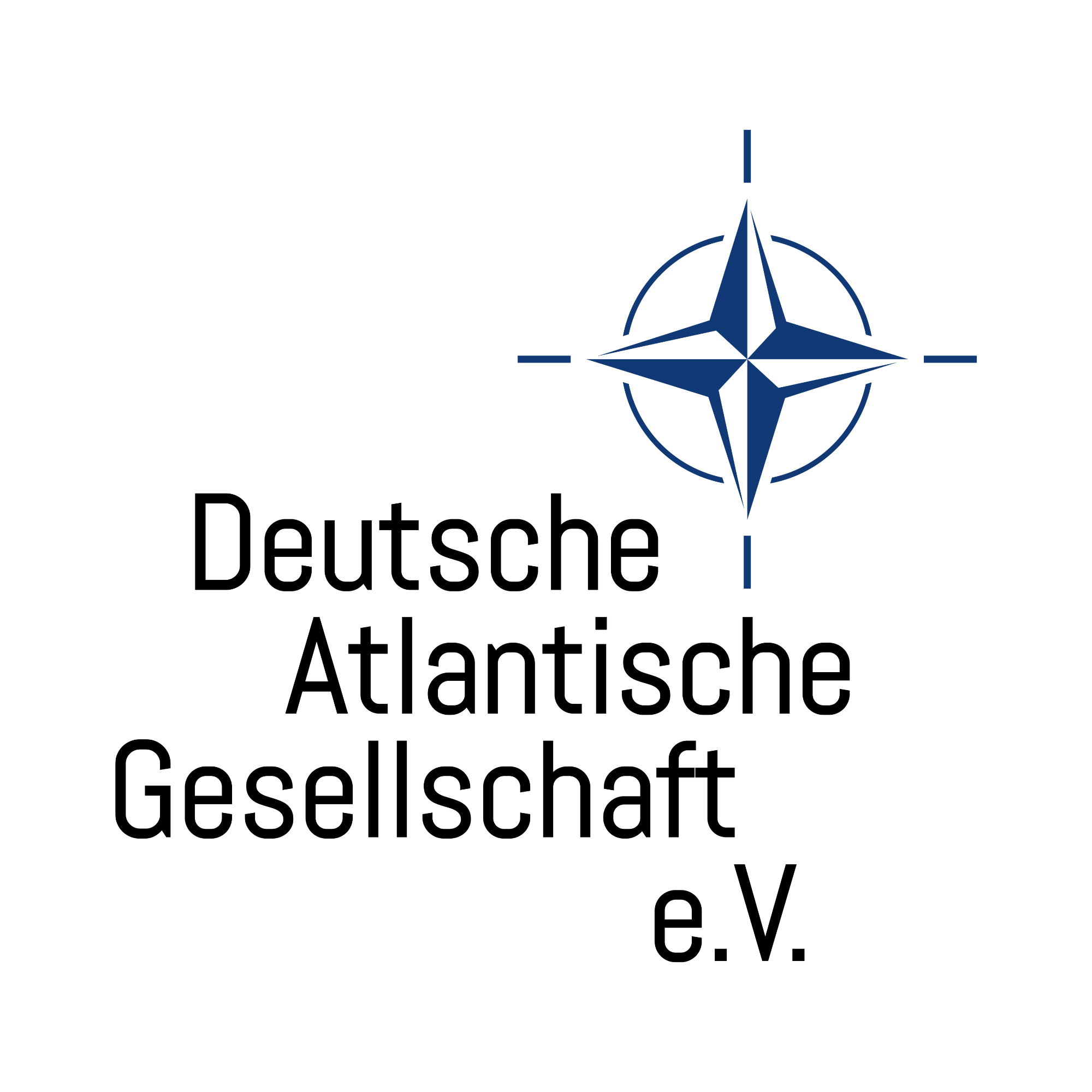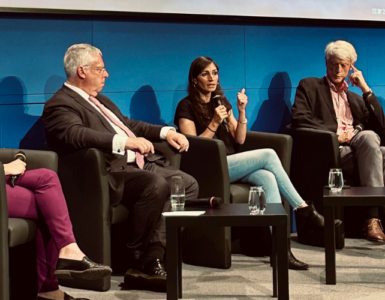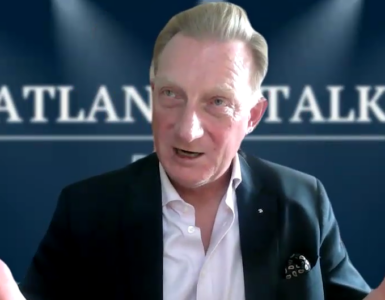It is May 5, 2022. The world is on the verge of chaos once again. Two months have passed since a powerful cyber-attack on the headquarters of the Taiwan Semiconductor Manufacturing Company (TSMC) brought production to a standstill. With global semiconductor supply chains on the brink of collapse, all sectors of the Germany economy are suffering. Manufacturers of smartphones, routers, cars, and refrigerators are affected by production slumps and delivery bottlenecks. Prices shoot up. Production losses of the Taiwanese chip giant are particularly harmful to industry. CEOs of Germany’s major automotive and electronics companies are pestering the chancellor’s office to “do something.”
In Washington, Congress is accusing China of orchestrating the cyber-attack on TSMC in an effort to coerce the reunification of the island with mainland China. Beijing vigorously denies these allegations and, for its part, highlights the “illegal presence” of Western naval forces in the Taiwan Strait. If not withdrawn immediately, the Chinese Coast Guard is left with no other option but to exercise its right to self-defense. A German frigate is part of the Western naval exercise.
At the same time, a dangerous situation is looming on Poland’s eastern border. After the unexpected death of Belarusian President Alexander Lukashenko, Moscow has started to amass thousands of troops along its border with Poland and Lithuania. Heavy equipment has been deployed to Russia’s western military district and the exclave of Kaliningrad. President Vladimir Putin justifies his country’s military build-up, proclaiming that Belarus is under threat of a Western-backed “color revolution.” Governments in Warsaw, Tallinn, Vilnius, and Riga are extremely alarmed by the growing Russian military presence on their border. Fearing that Moscow is seeking to invade the Polish Suwalki Gap that separates the Baltic states from the rest of NATO territory, allies on the eastern flank intend to formally propose the activation of Article 5, the Alliance’s collective defense clause, at a special emergency meeting of the North Atlantic Council.
How would Berlin’s newly-elected coalition government respond to such a situation? Would it agree to activate NATO’s mutual assistance clause and significantly upgrade the German contingent in Lithuania? What policy options would it have to exert political pressure on China, prevent a potential military escalation in the Taiwan Strait, and mitigate the economic consequences of the simultaneous microchip shortage? What expectations should Berlin reckon with on the part of its EU and NATO partners?
Questioning German Perceptions
For those seeking to define Germany’s political course and secure the German chancellorship, a serious discussion of a “strategic simultaneity” scenario is certainly warranted.
First, such a mental exercise can be extremely useful for ascertaining one’s own perspective on two of the largest continental powers in the world, their national objectives, and their capabilities. Does Germany’s future leadership assess Russia’s and China’s long-term global aspirations, notably vis-à-vis the West, plausibly and realistically? Are the German candidates aware that, for the first time since the end of the Cold War, Western democracies must cope with two serious strategic competitors rather than one?
The related strategic challenges cannot be compared with other security threats such as terrorism or instability on Europe’s external borders. Both China and Russia see themselves in fundamental opposition to the liberal-democratic order of the West. China has officially declared that it seeks to overtake the United States in key categories of state power over the next two decades. Its state-run economy and technological innovation capabilities have already begun to approach parity to the US in several areas. In the foreseeable future, Beijing’s growing military potential could rival Washington’s superpower status. The fact that one of the core tasks of the Chinese People’s Liberation Army is to protect national economic interests abroad, including in Europe, should serve as a wake-up call for German policymakers.
In contrast, Putin’s Russia does not possess the same magnitude of hard and soft power projection to advance its national goals. But supported by its modernized conventional forces, nuclear arsenal, and ability to leverage Europe’s energy dependence, Moscow has nudged the strategic balance within Europe in Russia’s favor over the last decade. From the Kremlin’s perspective, the calibrated use of hybrid methods to destabilize its western neighbors has proved effective, while remaining below the threshold of direct military engagement.
In recent years, the strategic partnership between Russia and China has grown steadily closer. Putin’s aggressive “Making Russia Great Again” policy correlates perfectly with President Xi Jinping’s postulate of “rejuvenation of the great Chinese nation, the greatest dream of all Chinese in modern times.” A close coordination of the strategic interests of both states is likely to be the rule rather than the exception in the future, precipitating multifaceted consequences for the stability of the international order.
Think, Plan, and Act Strategically
Second, the German candidates should be aware that their political statements and actions are analyzed in Moscow and Beijing with great attention and diligence. For both authoritarian regimes, democratic electoral cycles, open political discourse, and the formation of coalition governments are neuralgic weaknesses of the “decadent West,” which are rife for exploitation.
In particular, Russia and China are interested in assessing the new government’s ability to think, plan, and act strategically. What long-term ideas do the potential coalition partners intend to pursue to secure German and European interests? How pronounced will their political will be to act swiftly and decisively, and which specific instruments and capacities will they likely apply to advance German strategic objectives and European ideals?
Those in Moscow and Beijing who are looking for answers to these questions can lean back and relax, because thus far, Germany’s leading parties have hardly developed anything resembling a strategic mindset. Indeed, the Christian Democrats, Social Democrats, Greens, and Free Democrats have vowed to commit to the transatlantic partnership. With small nuances, they all call for a more cohesive and capable Europe. Unfortunately, concrete answers as to how these objectives can be achieved, remain scattered and thin.
Baerbock’s Nebulous Ideas
In their “Germany: Everything is in” election manifesto, the Greens recognize the West’s systemic competition with China and Russia, but at the same time they emphasize that the this competition will often allow for a choice “between the frying pan and the fire” only. The Greens adamantly call for a reform of the UN Security Council, the mandate of which they consider to be essential for future Bundeswehr missions abroad. But how such a reform could be implemented with, or rather against, the Security Council’s permanent veto members Russia and China is left completely open. In general, “candidate for chancellor” Baerbock wants a “tougher stance” toward China, but she has remained silent about what this implies for Germany’s export-driven economy or the existing and planned Chinese infrastructure projects within the country. Moreover, it remains unclear how a possible Green chancellor will mitigate the national security risks stemming from growing Chinese political and economic influence in Germany and in Europe.
The same is true for the relationship with Russia. Baerbock has spoken in favor of stopping the controversial Nord Stream 2 gas pipeline project and extending sanctions against Moscow. However, considering the strong pacifist camp in her own party, the lead candidate has repeatedly called for the withdrawal of US nuclear weapons from Germany; described the NATO 2‑percent rule as »absurd«; and more recently, tried to shine with the suggestion to offer the Americans a cyber-defense center in Germany as a means of a fairer burden-sharing in NATO. Seemingly, Baerbock overlooked the fact that a NATO Cyber Centre of Excellence has been coordinating the alliance’s internal cyber-defense efforts in Estonia for several years, and that a NATO Cyber Academy has only just been opened in Portugal.
More importantly, she ignores the justified expectations of Germany’s allies to provide NATO with three operational divisions by 2032 and for NATO’s spearhead Very High Readiness Joint Task Force (VJTF) to be fully equipped in 2023. Overall, the statements made by the Greens so far are unlikely to impress the leaderships in Moscow and Beijing; after all, one can confidently assume that they are aware of the internal party differences among the Greens and the considerable German military deficiencies, in terms of combat readiness and deployability.
Laschet’s Lack of Coherence
In the case of Baerbock’s rivals for the chancellorship, one also looks in vain for a new, coherent approach to Russia and China. Germany’s foreign and security policy must be “all of a piece”, says CDU leader and “candidate for chancellor” Armin Laschet. Demanding an “overall national strategy” and the establishment of a National Security Council, he has made two proposals that have been around the German security debate for years. With a view to China, the CDU/CSU candidate recognizes the strategic rivalry with China in principle; at the same time, however, he finds it worthwhile to extend and nurture Germany’s economic interdependence with China. In North Rhine-Westphalia, the state where he is currently premier, he seems to have made some inroads. The port of Duisburg is already part of the Chinese Belt and Road Initiative (BRI). Concurrently the city’s utilities (Stadtwerke) and Duisburg-Essen University are working closely with Huawei on the development of a Smart City project. Laschet has not yet commented on the associated security risks for Germany and the possibilities of political influence for China.
Neither has the CDU chief proposed anything new in dealing with Russia. In essence, he advocates for the maintenance of the status quo. »I would not change anything in the German, European Russia policy,« he said in a recent interview. This applies to the sanctions imposed in response to Russia’s illegal occupation of Crimea, but also to the Nord Stream 2 project. He has rejected concerns that the new pipeline in the Baltic Sea could be used to blackmail Ukraine as the previous transit country for Russian gas. Ukraine’s energy security could »be secured in parallel under international law.« At least the CDU candidate has spoken out in favor of better equipping the Bundeswehr in the future and adhering to NATO’s 2‑percent rule.
The SPD’s “Readiness for Dialogue”
In the election manifesto of the Social Democrats, who picked Finance Minister Olaf Scholz as their candidate last year, there are a few more concrete references to the growing tensions between the West and its rivals Russia and China. China’s assertive actions in Hong Kong and its increasing pressure on Taiwan are criticized, in addition to highlighting China’s repression of the Uighur Muslims and broader human rights violations. From the SPD viewpoint, “Europe must be ready for dialogue with China on cooperation and competition, constructively and critically.” What this could mean, however, remains elusive.
With regard to Russia, the Social Democrats are largely sticking to their traditional détente philosophy: »Despite all the necessary criticism, we are committed to engage in dialogue and cooperation with Russia,« it says in their election manifesto. Civil society contacts and visa facilitation for young people should help. Although interpersonal contacts are always useful, these steps are unlikely to detract the Kremlin from its strategic ambitions. The core messages of some leading Social Democrats, which do not exactly promote the much-touted unity of the West, are also highly problematic. This applies, for example, to the premier of Mecklenburg-Western Pomerania, Manuela Schwesig, who has accepted generous financial aid from the Russian state-owned company Gazprom to be able to continue the construction of Nord Stream 2, and her CDU counterpart in Saxony, Michael Kretschmer, who cordially invited President Putin to visit Dresden.
Understanding the Seriousness of the Challenge
The popular saying that you cannot win elections on foreign and security policy issues is becoming less and less meaningful in a globalized world. There is little doubt that Russia and China will put the West under greater pressure in the future, individually and collectively as a “strategic duo.” Our open and democratic societies offer several worthwhile targets for them. In the years to come, the West will have no choice but to manage a confrontational relationship with Moscow and balance the tension between strategic rivalry and interdependence with Beijing.
The core elements of a long-term national strategy toward Russia and China are obvious. They include an effective strategic foresight capacity along with regular exercises; the identification of national security risks, which result above all from China’s growing economic and technological influence in Germany; the consistent strengthening of resilience in the areas of critical and IT infrastructure; the targeted modernization of national military capabilities; the credible demonstration to actively defend our democratic values and the readiness for dialogue and cooperation as long as it corresponds to German and European interests.
For Germany’s party leaders acknowledging and understanding that Germany urgently needs such a long-term strategy would be an important first step.























